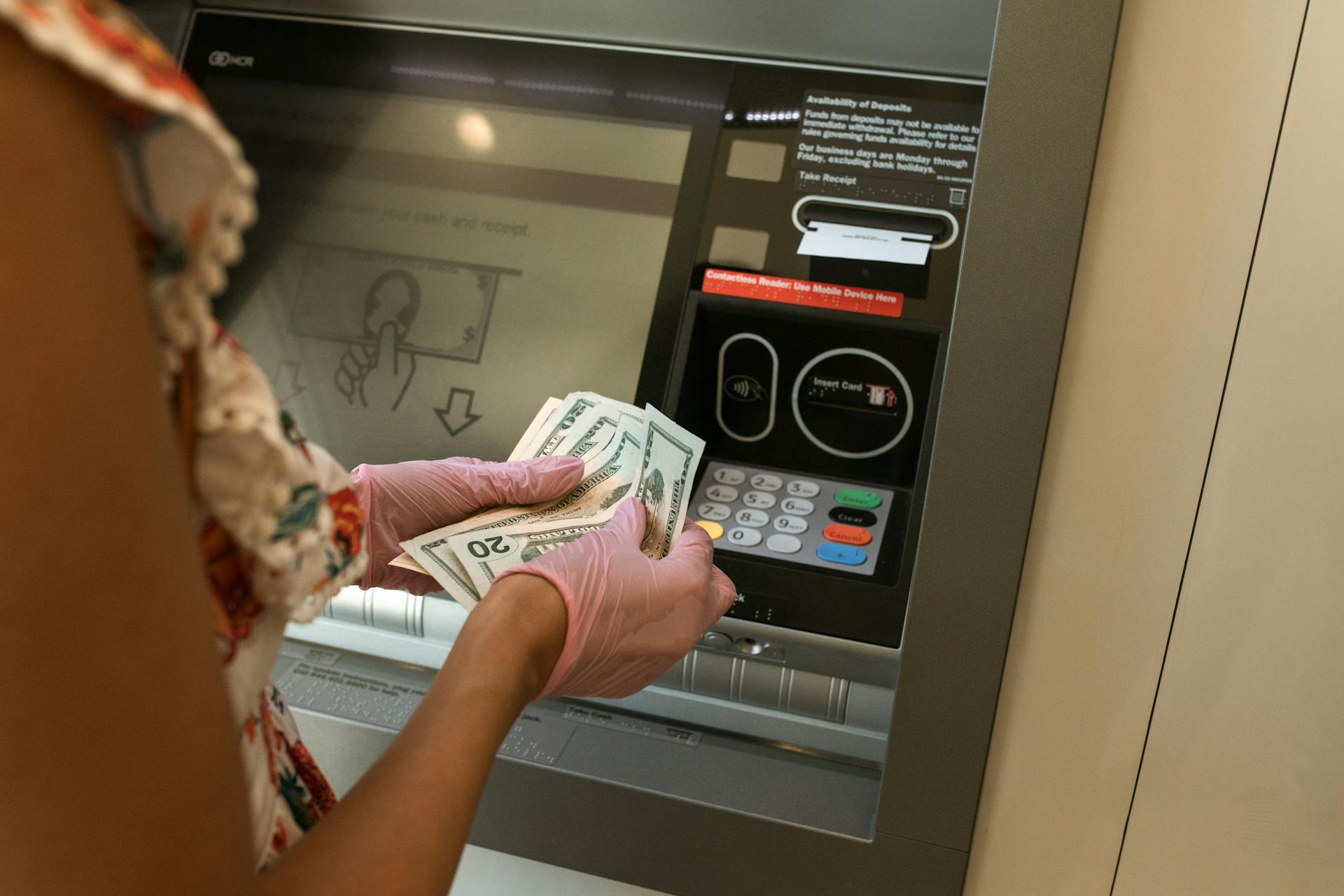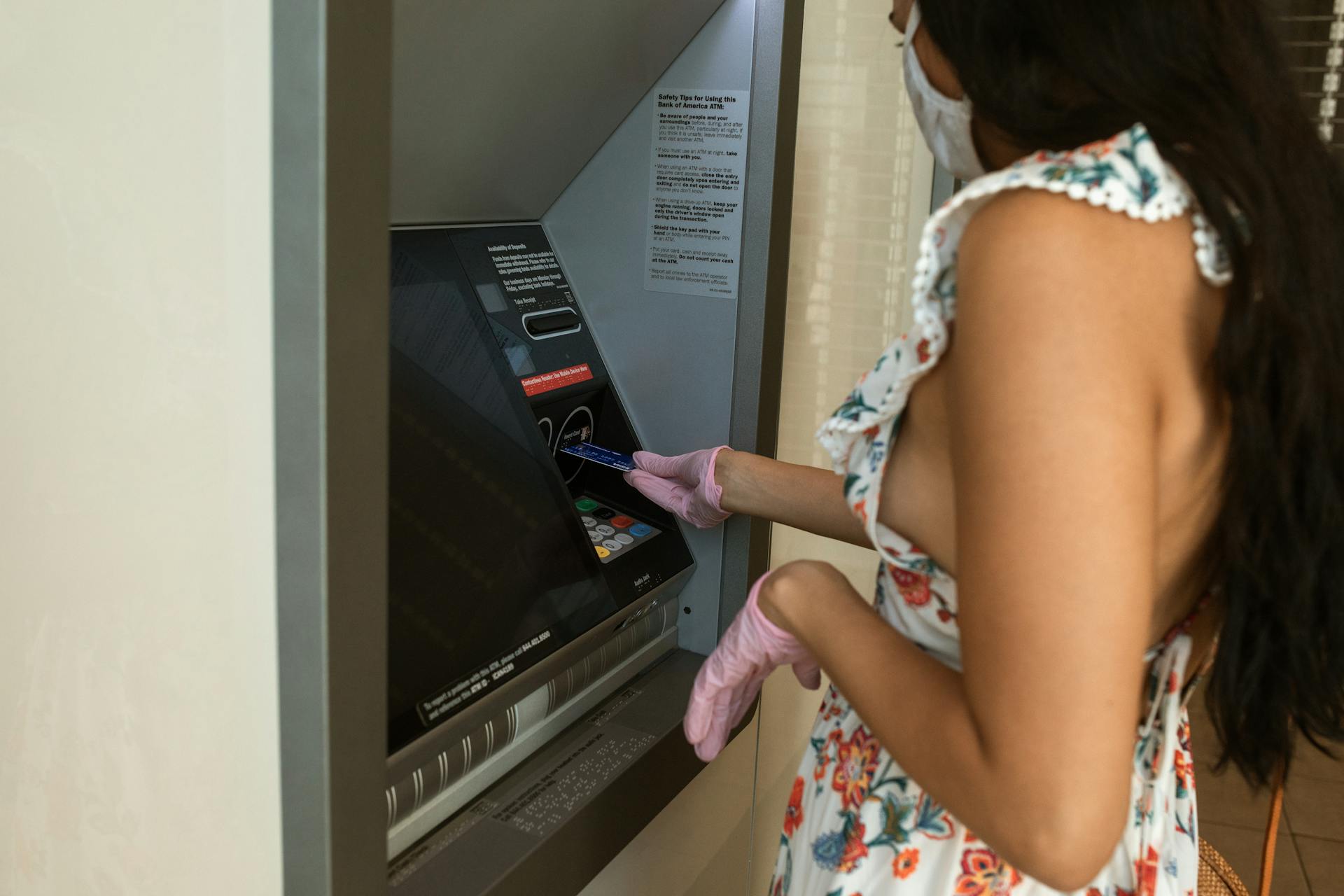
Cash out refi closing costs can be a significant expense, but it's essential to break them down to understand what you're paying for. The total closing costs for a cash out refi can range from 2% to 5% of the loan amount, depending on the lender and the type of loan.
You'll typically pay fees for services like title insurance, appraisal, and loan origination. These fees can add up quickly, so it's crucial to factor them into your budget. In some cases, you might also pay a mortgage broker fee, which can range from 0.5% to 2% of the loan amount.
The good news is that some of these fees can be rolled into the loan, which means you won't have to pay them upfront. However, this will increase the total amount borrowed and the interest paid over the life of the loan. It's essential to carefully consider these costs and how they'll impact your long-term financial situation.
Readers also liked: No Closing Cost Equity Loan
What Is a Cash Out Refi?
A cash out refi is a type of mortgage refinance that allows homeowners to borrow more money than they owe on their current loan.
By tapping into their home's equity, homeowners can access a lump sum of cash to use as they see fit. This can be a great way to fund home renovations, pay off high-interest debt, or cover unexpected expenses.
The cash out amount is determined by the difference between the home's current value and the outstanding balance on the original mortgage.
How it Works
A cash-out refinance works by using your home as collateral for a new loan, creating a new mortgage for a larger amount than currently owed. This new loan pays off your previous, smaller mortgage balance, and you get paid the difference in cash.
You'll need to consider the increased loan balance and monthly payment, as withdrawing your home's equity to access cash at the loan's closing will add to your overall debt.
Suggestion: New Jersey Refinance Mortgage
The new mortgage will have a higher loan balance, which can increase your monthly payment since you're borrowing more money. This is a crucial factor to keep in mind when deciding if a cash-out refinance is right for you.
A rate-and-term refinance, also called no cash-out refinancing, is a basic mortgage loan refinance that helps you attain a lower interest rate or adjust the term of your loan, but nothing else changes on your mortgage.
With a rate-and-term refinance, you can take advantage of lower interest rates or switch to a 15-year mortgage to save on the loan's total interest, but you'll need to consider the trade-off of lower monthly payments.
Cash-out refinancing, on the other hand, allows you to receive the difference between the two loans in tax-free cash, but it usually comes with higher interest rates and other costs, such as points.
Closing costs for a cash-out refinance will run you 2-5% of the new loan amount, which can add up quickly. For example, a loan of $180,000 would cost you between $3,600-$9,000.
If the new loan exceeds 80% of the home's value, you'll need to pay for private mortgage insurance, which can range from 0.55%-2.25% of the loan, adding up to as much as $4,050 a year.
Broaden your view: Can I Refinance a Fixed Rate Mortgage
Determine Your Needs
Determine your cash needs before considering a cash-out refinance, as borrowing a large amount can translate to more debt and a higher payment.
You can use the funds from a cash-out refinance to pay for big expenses like medical or educational fees, consolidate debt, or as an emergency fund.
It's essential to balance the need for cash with your ability to repay a larger mortgage loan, as this will determine the success of the cash-out refinance.
Consider reading: Mortgage Refinance and Debt Consolidation Loans
What Is Home Equity?
Home equity is the market value of your home minus any liens, such as the amount you owe on a mortgage or a home equity loan.
Your home's value can fluctuate based on real estate market conditions in your community or region. This can impact the amount of equity you have in your home.
The equity in your home can change over time due to market fluctuations.
Intriguing read: Cash Value vs Cash Surrender Value
Determine Your Needs
You need to consider how much cash you actually require, as borrowing a large amount can lead to more debt and a higher payment.

Borrowers often use the funds from a cash-out refinance to pay for big expenses such as medical or educational fees.
Paying off debt or creating an emergency fund are also common uses for the cash.
However, it's essential to balance the need for cash with your ability to repay a larger mortgage loan.
Mortgage lenders impose borrowing limits on how much you can borrow through a cash-out refinance—typically 80% of the available equity of your home.
You might enjoy: No Income Verification Cash-out Refi
Finding a Lender
To get a cash-out refinance loan, borrowers need to find a lender willing to work with them.
A lender assesses the current mortgage's terms and the borrower's credit profile to make an offer based on an underwriting analysis.
The lender makes an offer that results in a new loan that pays off the previous one and locks the borrower into a new monthly installment plan.
Explore further: Can I Refinance My Mortgage and Home Equity Loan Together
Find a Lender
Finding the right lender is crucial for a cash-out refinance. Borrowers should seek out a lender willing to work with them.
For your interest: Can You Refinance a Mortgage with a Different Lender
The lender will assess the current mortgage's terms, the balance needed to pay off the loan, and the borrower's credit profile. This analysis will help determine the best course of action.
A lender makes an offer based on this underwriting analysis, which the borrower can use to compare with other lenders. This offer will outline the new loan terms and monthly installment plan.
The new loan will pay off the previous one, and the borrower will receive the excess amount in cash. This cash can be used for various purposes, such as paying off debts or financing home improvements.
For another approach, see: Who Will Refinance My Mortgage with Late Payments
Compare Mortgage Offers
Comparing mortgage offers is a crucial step in finding the right lender. You can shop around and compare options from several mortgage refinance lenders.
Look at the annual percentage rate (APR), which measures the cost of interest and fees, to get a fuller sense of the loan's cost. This will give you a better idea of the loan's overall cost.
For another approach, see: Usda Mortgage Closing Costs
Consider working with a mortgage broker to get a range of offers. They can help you compare different options and find the best one for you.
Always get a quote from your existing lender, too, in case it offers a lower-cost refi or other repeat customer benefits. This way, you can compare your options and make an informed decision.
When to Pay FHA Mortgage?
You can pay your FHA mortgage when interest rates are favorable, allowing you to lower your monthly bills or add improvements to your home.
Many homeowners with FHA mortgages choose to refinance to a conventional mortgage to eliminate the cost of mortgage insurance required with FHA loans.
You can also refinance to a conventional loan if you have 78% of equity in your home, which may allow you to lower PMI payments.
Be prepared to pay closing costs associated with refinancing, which can range from 1.5% to 3% of the loan amount.
If this caught your attention, see: Pay Upfront to Refinance a Home Mortgage Is It Normal
Closing Costs
Closing costs can add up quickly when refinancing your mortgage. The average mortgage refinance runs $2,375 in closing costs, excluding any taxes. These costs vary primarily according to the size of your loan and where you live.
You can expect to pay between 2 percent and 5 percent of the new loan balance in closing costs. For a $200,000 mortgage, that's anywhere from $4,000 to $10,000 in closing costs.
Some common closing costs include an application fee, which can range from $75 to $300, and an origination and/or underwriting fee, which is typically 1% to 1.5% of the loan principal.
Here's a breakdown of some common closing costs:
Keep in mind that these costs are in addition to any interest you'll pay at a new rate, which will depend on many variables, including your credit score, lender, type of refinance, loan size and term, and property type.
Pros and Cons
A cash-out refinance can offer many benefits, but it's essential to weigh the pros and cons. Lower interest rates can improve your finances, and the money can be used for debt consolidation or expenses.
You can use the funds to pay off high-rate debt or fund a large purchase, particularly beneficial when rates are low. Improving your finances and credit can also be achieved by paying off credit card debt or personal loans with a lower interest rate mortgage loan.
Here are some benefits of a cash-out refinance:
- Lower interest rate
- Improves finances
- Money for debt consolidation or expenses
Consider a no-closing cost refinance if you're low on cash, but be aware that the lender may raise your interest rate or fold the closing costs into the new loan.
Pros and Cons
A cash-out refinance can be a game-changer for homeowners, but it's essential to consider the pros and cons.
One of the significant advantages of a cash-out refinance is that it can offer a lower interest rate, which can save you money on debt servicing costs. This is especially beneficial if you use the funds to pay off high-rate debt or personal loans.
You can also improve your finances and credit by consolidating debt with a cash-out refinance. By reducing the number of loan and credit card payments, you might even see an improvement in your credit score.
A different take: Credit Union Home Refinance Rates

The funds from a cash-out refinance can be used for various purposes, including paying off consumer debt, making large purchases, or covering expenses. However, it's crucial to get your spending under control to avoid falling into an endless cycle of debt reloading.
Here are some key benefits of a cash-out refinance:
- Lower interest rate
- Improves finances
- Money for debt consolidation or expenses
If you're considering a cash-out refinance, be aware that you might not be able to avoid closing costs entirely. A no-closing cost refinance might be an option, but it often comes with a higher interest rate or folded closing costs into the new loan.
Heloc vs
A HELOC provides you with a line of credit, allowing you to pull out funds over time.
You can think of it like a credit card, but with your home as collateral instead of your income.
Both HELOCs and cash out refinances tap into your home's equity, but a HELOC comes with a variable APR that could spike down the line and cost you a lot of money.
This means you'll need to be prepared for potential rate increases, which could affect your monthly payments.
Take a look at this: Are There Closing Costs on a Heloc
Frequently Asked Questions
What happens at a cash-out refinance closing?
At a cash-out refinance closing, your existing mortgage is paid off and any remaining funds are disbursed to you. This process typically includes paying off closing costs and prepaid items, such as real estate taxes and homeowners insurance.
Sources
- https://www.investopedia.com/terms/c/cashout_refinance.asp
- https://www.bankrate.com/mortgages/how-much-it-costs-to-refinance/
- https://sf.freddiemac.com/working-with-us/origination-underwriting/mortgage-products/cash-out-refinance
- https://www.mutualmortgage.com/articles/refinance/cash-out-refinancing-faqs/
- https://www.debt.org/real-estate/mortgages/refinance/cash-out/
Featured Images: pexels.com


